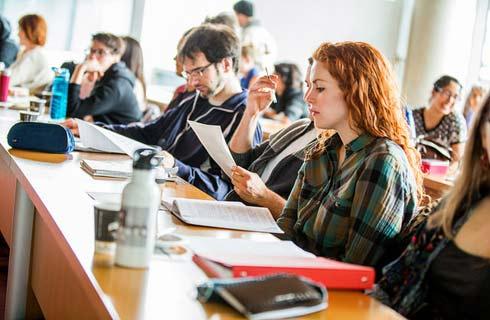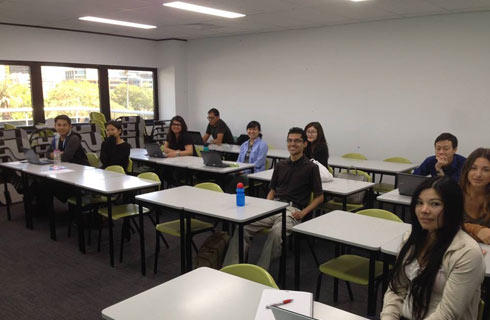国际学生入学条件
All B.A. degree holders are first admitted into the M.A. program and may apply later to the Ph.D. program on the basis of their academic performance here. There is no guarantee that someone admitted to the M.A. program will later be admitted into the Ph.D. program.
Applicants are usually judged by the following criteria (which are not listed in order of importance):
1. Letters of Recommendation: Three letters of recommendation should accompany each application. Students should request letters from professors who know them well, preferably from class work in their last two years of college. The letters of recommendation are submitted online through the application system on the Graduate School website.
2. Personal Statement: This letter gives the Program’s Admissions Committee some idea about the applicant’s writing style, range and depth of ideas, quality of mind, and motivation to embark on an advanced degree program in Medieval Studies. Try to convey the same information in this letter than you would in a personal interview, those things about you that cannot be expressed quantitatively. Details about your preparation, your strengths and weaknesses as a student, any academic honors, and the reasons you selected the field will all be helpful. This letter should be two pages long; it should not be longer. Be certain to put your name and social security number on the statement.
3. Writing Sample: A writing sample is required with a Ph.D. application. A writing sample is recommended at the M.A. level. Usually, the writing sample consists of a term paper written for a course in an area relevant to the applicant’s intended area of specialization. The writing sample should be an edited and polished piece of prose that demonstrates your writing ability. (Please do not send the original, graded term paper.) The paper should have a title; your name should be on every page.
4. GPA: Though there is no official cut-off GPA for applicants to the program, a GPA of 3.5 is the rough minimum standard under normal conditions. The committee will, of course, evaluate transcripts and will take unusual circumstances or patterns into account.
5. Graduate Record Exam (GRE) Scores: Because there is no Subject Exam in Medieval Studies, only the GRE Generalist Exam is required. If, however, a candidate has taken a Subject Exam in a relevant field of study, that exam score should be included in the application packet. The committee will look at the verbal and analytic scores/writing test assessment in particular–i.e., the quantitative score is less important for our purposes.
Minimum overall scores of 79 (Internet-based test – iBT/ iBT Home Edition), 550 (Old Paper-based test – PBT) or 22/30 on each of the Listening, Reading, and Writing sections (“New” Paper-based test- PBT) or higher on the TOEFL test. (TOEFL Essentials is not accepted.)
Personal Statement
A minimum overall score of 6.5 or higher on the IELTS Academic Test
展开
IDP—雅思考试联合主办方

雅思考试总分
6.5
- 雅思总分:6.5
- 托福网考总分:79
- 托福笔试总分:550
- 其他语言考试:Duolingo 100
CRICOS代码:
申请截止日期: 请与IDP联系 以获取详细信息。
课程简介
The inception of the Medieval Studies Program at the University of Connecticut was the informal formation of an interdisciplinary Medieval Studies Committee at a faculty luncheon in the fall of 1966. In the spring of 1967, the Committee was formally established as part of the College of Liberal Arts and Sciences. At the time, the Committee was chaired by Fred A. Cazel, Jr. (History) and included Joyce Brodsky (Art History), Stephen J. Kaplowitt (German), Gardiner H. London (Spanish), Arthur S. McGrade, Jr. (Philosophy), James A. S. McPeek (English), Charles A. Owen, Jr. (English), Joseph Palermo (French), and Thomas A. Suits (Classics).<br><br>The purposes of the Medieval Studies Committee were to offer both undergraduate and graduate programs with a core of courses in fields related to medieval studies, as well as to sponsor a Medieval Colloquia series of invited lectures. In the spring of 1969, a graduate program offering degrees of Master of Arts and Doctor of Philosophy in Medieval Studies was established, with the admittance of graduate students the following fall. The initial proposal of the Medieval Studies Program included the following descriptions:<br>This program, intended to provide a synthesis of broad areas of medieval culture and thought as a basis for constructive research in specialized aspects of medieval cultural and intellectual history, is interdepartmental in nature and would include course offerings in the areas of medieval languages and literature, history, art, philosophy, and philology.
展开







 预科
预科 奖学金
奖学金 实习机会
实习机会 在校学习
在校学习 跨境学习
跨境学习 校园授课-线上开始
校园授课-线上开始 在线/远程学习
在线/远程学习














 渥太华大学
渥太华大学

 纽芬兰纪念大学
纽芬兰纪念大学

 多伦多大学
多伦多大学

 多伦多大学
多伦多大学

 维多利亚大学
维多利亚大学

 维多利亚大学
维多利亚大学









 美国
美国